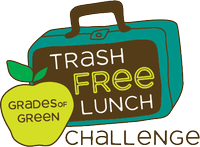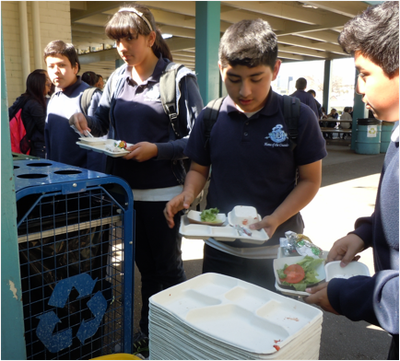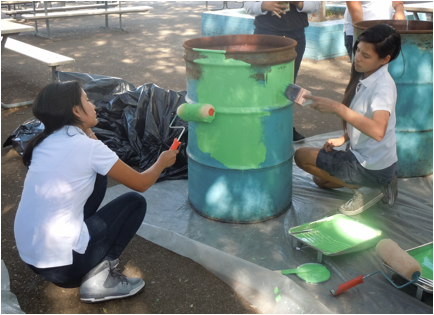Grades of Green

Overview
Grades of Green is a non-profit organization that focuses on various facets of protecting the environment. They partner up with schools to help implement composting and recycling at the school site; this year, our school was fortunate enough to be one of the few schools chosen to participate in the program. Grades of Green volunteers work with one lead teacher of the school and a small group of students, so the 8th grade Advanced Via Individual Determination (AVID) students and I volunteered to launch the program for Berendo Middle School.
Main Activities
- Initial visit from Grades of Green to assess school lunch area and gather data
- Grades of Green met with AVID class to introduce the program & its components
- Sorting of compostable food and recyclable material during lunch
- Marketing recycling and composting school-wide to encourage student participation
- Help in-class recycling for every classroom
- Upkeep and manage the compost machine & fertilizer created by the machine

- Planned the next steps with AVID students to create a schedule for volunteers during lunch time for sorting and upkeep of the compost machine
- Before launching the program, AVID students visited all the intervention classes to present information about Grades of Green and the importance of environmental stewardship
- Grades of Green held a school wide assembly to jump start the program
- Compost machine was situated in school garden and recycle bins were placed throughout campus
- AVID students painted bins so everyone could distinguish between recycling and trash bins
- Began composting every Tuesday and Friday to promote recycling and composting on campus
- Requested Grades of Green to return to make same presentation for charter school with whom we share a campus
- Collaborated with Gear Up during Earth Week to further promote recycling and composting
Reflection
When Grades of Green volunteers first visited the 8th grade AVID classes, the students were thrilled to have the opportunity to be leaders on campus. I believe that this was because they had an authentic responsibility to start a program at school. The students agreed to take turns volunteering during lunchtime to teach and monitor students on how to recycle and sort, and also to maintain the compost machine.
What was truly helpful were the regular visits from Grades of Green after the program was established, because they came and gave us feedback on how we could make improvements. They also gave us data regarding the number of trays recycled in comparison to the number of lunches served; it was a way for us to know how we were doing compared to our initial assessment.

In many ways, I feel that the program has failed because we did not accomplish the goals we set for ourselves. Nevertheless, I need to remember that just because we have set backs does not mean that it has been unsuccessful. It has definitely been a learning process for both the students and myself. We had big goals when we first began, but through this experience, I have learned that starting small is key; since recycling is a development of habit, it is going to take a long time.
On a positive note, a few “champions of recycling” have emerged from the 8th grade AVID class and it has been a joy to see them take ownership of the program, manage themselves on what needs to be done, and promote recycling among their peers.
Connection to CPSEL
4.3 Engaged and coordinated support from agencies outside of the school to support equitable success of all students
5.1 Modeled personal and professional ethics, integrity, justice, and fairness and expected the same behavior from others
6.3 Incorporated input from the public by opening the school, welcoming, and facilitating constructive conversations about how to improve student learning
Supporting Documents
Grades of Green Initial Analysis

